Over the past couple of months I’ve been gathering and uploading material to the reconstructed website. It has been a curious process: looking back on old work, finding images and texts I’ve forgotten about and arranging everything into an archive that, I hope, is easy to access and interesting to explore. It is always hard to know what to include and exclude but I hope there’s enough here to give a sense of the breadth of my interests and ideas, and to see how some themes re-occur over and over again. I will be adding to this Blog and to the website on a regular basis. Feedback will be much appreciated.
Category Archives: Uncategorized
Greenland snow and Ezra Pound
I once flew over Greenland and that aerial view of beautiful snowfields stays in my mind – Ultima Thule, the white lands in which an absence of colour and formal definition becomes a presence of intense light, tonal variation and indefinite forms. A strange subtle region of scribbled inclinations, indentations, ripples, serrations, stubbled wastes and delicate, almost misty, whitenesses upon which the eyes can’t find a hold.
Somehow, like the Greenland whitelands, Ezra Pound’s work is an unchartable region, and the long silence of his later years seems entirely appropriate – a wordless desert. What could be said, had been said. What more could he add? And what was the point of saying more, when there seemed to be so few who would listen, let alone understand.
After his long incarceration in St Elizabeth’s, Pound left America for Italy. Guy Davenport tells a story of how, one day, a few years after returning to the Mediterranean, Pound was sitting in his garden. Unlike the other days when he had sat and stared or read through familiar books and papers, he suddenly started typing on his old cranky typewriter. He began to write letters, something he had not done in years. He wrote a stream of them and they were despatched to various destinations. Within a week the unopened envelopes began to return to Pound’s home. If the postman had looked carefully at the front of the envelopes he would have noticed that they had been addressed to James Joyce, Ford Madox Ford, Wyndham Lewis and W.B. Yeats – all of whom were long dead. It was as if even the dead were no longer interested in what Pound wrote. Or perhaps, it was only the dead who could answer Pound’s silence in their own eloquent way.
Scribbles in the dust
Pyrrho, the ancient Greek sceptic, started out as a painter. He, and I, can’t forget the fact that all our representations, theories and ideas are so much spit and pigment, scribbles in the dust, marks against oblivion – possibilities of the moment, rendered obsolete almost as soon as they are formed. All our utterances are little more than the eloquence of crows or gulls or bees about the hive. Very occasionally we rise to the compass of song, the melodic fluency of a blackbird, or robin, or nightingale. No matter what we say or write or think, we can do no more than throw a murmur into the air. Like a leaf or feather it may catch the breeze and be lifted high or fall to the ground. Whatever happens it will eventually join all other feathers and leaves trampled underfoot, becoming in time leafmould, soil, the compost out of which new growth emerges.
So also for opinions, ideas and theories, however lofty, they are all subject to the laws of gravity, the pull of conditionality and uncertainty, the necessity of ‘perhaps’, ‘maybe’, ‘it seems’, or ‘it appears’ – never the certainty of ‘it is true’.
Likewise with decisions – all can be rationalised and confirmed as valid. Arguments can be mounted in support of this course of action and for the opposite course. One is probably no better, or no worse, than another. We can only act in the knowledge that we could have acted differently and our actions may well have been just as worthwhile or just as fruitless. To do something in the belief that we do the right thing, let alone the ‘only’ thing, is to believe the leaf or feather will never fall. To be attached to this belief is to be deluded – to defy gravity, to gobble like a turkey while thinking we sing like a starlight nightingale.
Neither here nor there
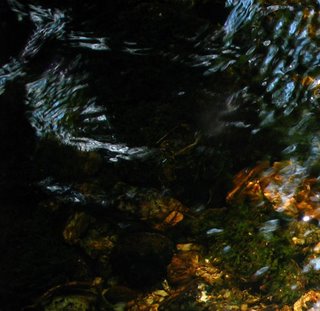
In the dark world of the pond
there is another version of our world
the symmetry of reflections binds the two
where they meet is neither here nor there
a nowhere exists that is this invisible skin
this transparency where the light changes direction
the shaft of lily breaks (yet is unbroken)
the pond skater meets its opposite number
(yet there is no number to this once and only world
One mind walking
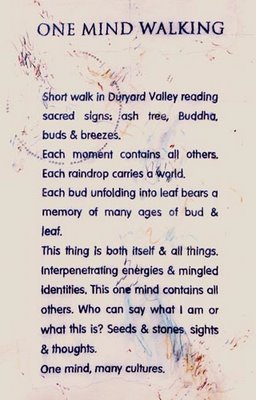
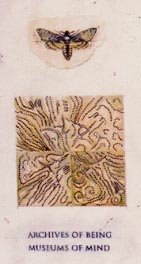
Fragment of a drawing with inscribed text. Drawing entitled, Cultures of Leaf, Flesh & Stone, June 2002
As if nowhere
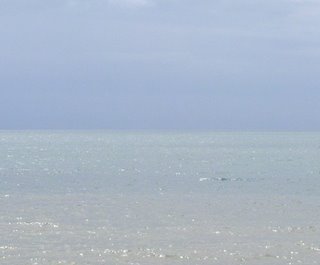
On a misty rainy day the sea goes on forever, as does the sky. There’s no horizon, no dividing line, no skin of water or air. And yet we search the grey infinity to find a line, to find a bearing that will remind us where we are – as if nowhere was not enough.
Drawing stones
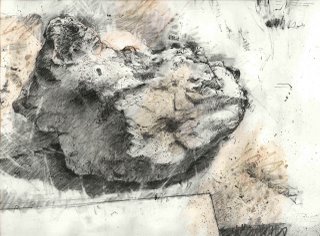
Ruskin reckoned that you could learn all you need to know about nature, the world and the infinite by drawing stones. The forces that formed this stone, formed mountains. As I draw it I learn about it. Following its contours with my eyes and a pencil I get to know it. Picking it up as I draw I feel its silent history. Slowly I lose myself in its rocky substance. In the act of perceiving and drawing I realise that the stone is both a substance and a play of light on a retina.
Inside every apparently solid object there is an infinity of space, just as in every mind there is an imaginative infinity.
Birds against a dark sky
too many birds
walking the skies
hard to keep
just one
in mind
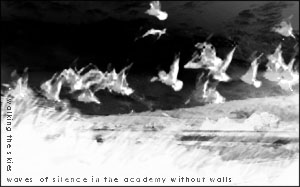
another mystery
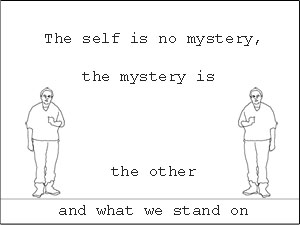
don’t forget the lucid
moment or the appeal
of fire
a hunter’s sight
may drown in an ocean
of detail
too many tracks
to track
In memory of Guy Davenport (1927-2005)
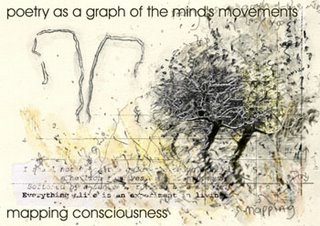
In memory of Guy Davenport (1927-2005) – who died even as I was first reading his essays and feeling kinship with his many-stranded mind:
… he had in his mind a vast library of books none of us will have the time or inclination to read. Who knows what company he kept in his imagination’s many rooms, or what corridors he walked on his way to assignations with eccentric facts and lonesome quotations. He wrote hundreds of letters like countless bees leaving the hive on urgent summer business. Maybe this is why his lungs gave out: too many pollinating bees going in too many directions, a dancing too complex for the eyes, but for the mind, his mind, that’s another thing. The etymology of each dancing buzz was enough to keep a civilisation occupied til the time comes for ruins. There is no easy compass of the present but the past has a geography and the footloose can wander and not count the days. Somehow this is how I see him, not counting the days, but footloose in a past that was always present to his mind, without punctuation or rhyme, yet crisscrossed with lucidity and unexpected correspondences. Out of these small traceries of connection, out of echoes and shadows, out of ruins ribbed with tumbledown ramparts, he used stones to build windows without walls…